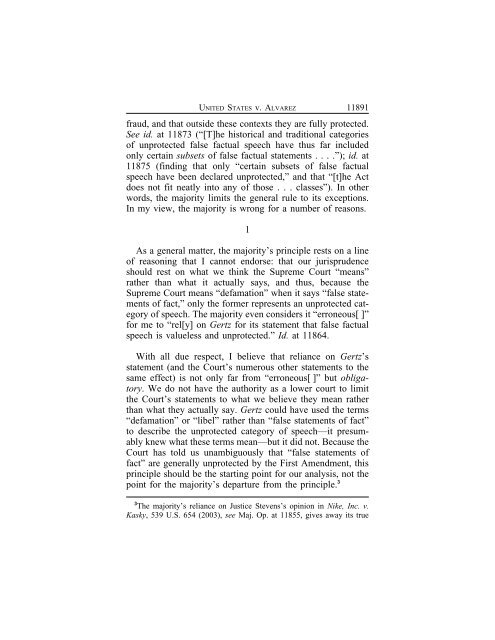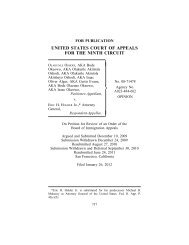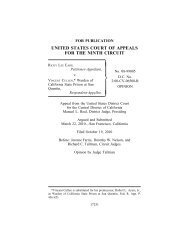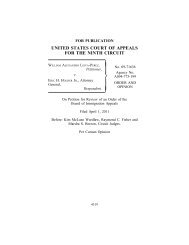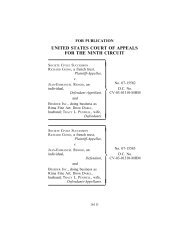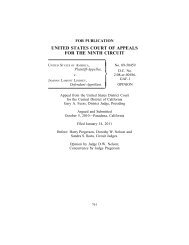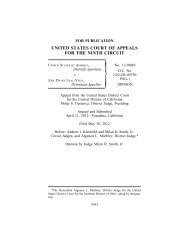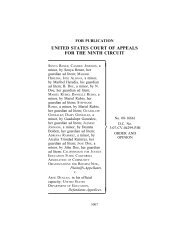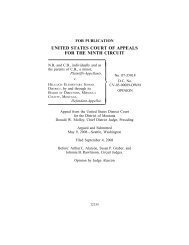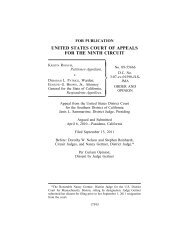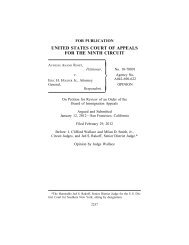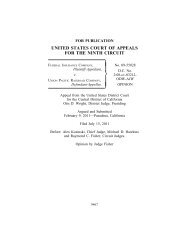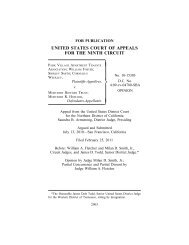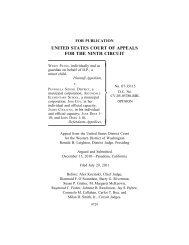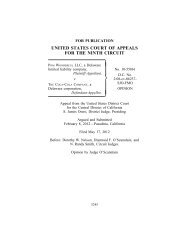USA v. Xavier Alvarez - Ninth Circuit Court of Appeals
USA v. Xavier Alvarez - Ninth Circuit Court of Appeals
USA v. Xavier Alvarez - Ninth Circuit Court of Appeals
You also want an ePaper? Increase the reach of your titles
YUMPU automatically turns print PDFs into web optimized ePapers that Google loves.
UNITED STATES v. ALVAREZ<br />
fraud, and that outside these contexts they are fully protected.<br />
See id. at 11873 (“[T]he historical and traditional categories<br />
<strong>of</strong> unprotected false factual speech have thus far included<br />
only certain subsets <strong>of</strong> false factual statements . . . .”); id. at<br />
11875 (finding that only “certain subsets <strong>of</strong> false factual<br />
speech have been declared unprotected,” and that “[t]he Act<br />
does not fit neatly into any <strong>of</strong> those . . . classes”). In other<br />
words, the majority limits the general rule to its exceptions.<br />
In my view, the majority is wrong for a number <strong>of</strong> reasons.<br />
1<br />
11891<br />
As a general matter, the majority’s principle rests on a line<br />
<strong>of</strong> reasoning that I cannot endorse: that our jurisprudence<br />
should rest on what we think the Supreme <strong>Court</strong> “means”<br />
rather than what it actually says, and thus, because the<br />
Supreme <strong>Court</strong> means “defamation” when it says “false statements<br />
<strong>of</strong> fact,” only the former represents an unprotected category<br />
<strong>of</strong> speech. The majority even considers it “erroneous[ ]”<br />
for me to “rel[y] on Gertz for its statement that false factual<br />
speech is valueless and unprotected.” Id. at 11864.<br />
With all due respect, I believe that reliance on Gertz’s<br />
statement (and the <strong>Court</strong>’s numerous other statements to the<br />
same effect) is not only far from “erroneous[ ]” but obligatory.<br />
We do not have the authority as a lower court to limit<br />
the <strong>Court</strong>’s statements to what we believe they mean rather<br />
than what they actually say. Gertz could have used the terms<br />
“defamation” or “libel” rather than “false statements <strong>of</strong> fact”<br />
to describe the unprotected category <strong>of</strong> speech—it presumably<br />
knew what these terms mean—but it did not. Because the<br />
<strong>Court</strong> has told us unambiguously that “false statements <strong>of</strong><br />
fact” are generally unprotected by the First Amendment, this<br />
principle should be the starting point for our analysis, not the<br />
point for the majority’s departure from the principle. 3<br />
3 The majority’s reliance on Justice Stevens’s opinion in Nike, Inc. v.<br />
Kasky, 539 U.S. 654 (2003), see Maj. Op. at 11855, gives away its true


